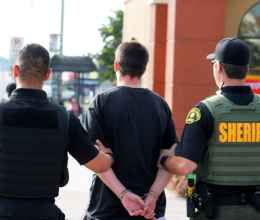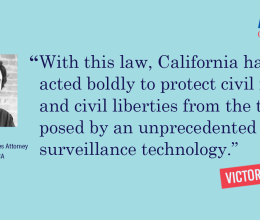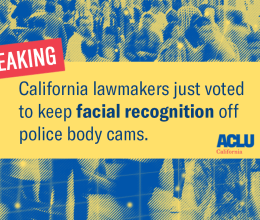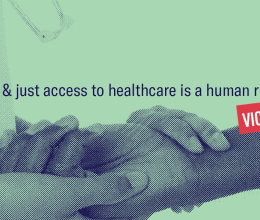In recent months, we have seen a surge in the use of surveillance technologies, as they have become more powerful and easily available. These technologies collect information about our whereabouts and other sensitive details about our lives. Often bankrolled by federal funds, technologies like automatic license plate readers, drones, and social media surveillance systems have invaded our communities without our knowledge or input. This has not only changed the way we are policed, but also how we define the balance between safety and privacy.
No, government spying is not new. However, the threat of its abuse is now greater than it ever has been in the past.
Surveillance not only feeds databases that can be abused, it leads to real world harms that disproportionately affect immigrants, people of color, and Muslim Americans. Federal immigration authorities are increasingly seeking to exploit these local surveillance systems, often without local knowledge. Earlier this year, for example, news broke that U.S. Immigration and Customs Enforcement (ICE) had obtained access to a database operated by a company called Vigilant, which hosts license plate location data collected by local law enforcement agencies across the United States.
The overreaching doesn’t stop here. Local activists, like the Black Lives Matter Movement, have also been a target in unwanted surveillance simply by attending rallies, or speaking out against police brutality. This has happened locally in San Diego as well. Local activists who chose to speak out and gather in support of Robert Branch; a San Diego man charged criminally for an encounter in which he resisted being choked unconscious by a plainclothes police officer, learned that “law enforcement had quietly been attending rallies and community meetings” to record and photograph attendees. Being a person of color or an immigrant are not acts of political dissent or protest. Most of all, none of these things are crimes that justify being monitored by any law enforcement agency.
What can we do now?
We must call upon local government officials, law enforcement agencies, and tech companies to fully take into consideration the ramifications of using private technologies in public spheres, and educate one another on the steps we can take to ensure that our personal data is secured. As people are increasingly participating in actions and public protests, it is imperative that the community take the proper precautions to protect themselves from unwanted surveillance. Knowing how to secure your devices and your personal information is critical to effective and safe advocacy practices. The ACLU of San Diego & Imperial Counties will be hosting an interactive session on digital privacy best practices on September 13th from 6:30-7:30 at Southwestern College in National City. Attendees will have the opportunity to learn what surveillance actually looks like, especially for people of color, and tips on how to protect themselves in the digital era that we live in.
Chloe Triplett, Policy Advocate, ACLU of San Diego & Imperial Counties
Secret Surveillance Is Happening in Our Communities. How Do We Protect Ourselves?
Related Issues
Related content

Lagleva et al. v. Doyle
October 14, 2021
What to do if you're stopped by the police or law enforcement .
August 9, 2020Advocacy
August 5, 2020
Prevent Expansion Of Facial Recognition Tech (Oppose AB 2261)
May 21, 2020
California Governor Signs Landmark Bill Halting Facial Recognition...
October 9, 2019
California Senate Votes to Block Face Recognition on Police Body...
September 11, 2019
California Lawmakers Pass Historic Bill Abolishing Copays in Jails...
September 9, 2019California is About to Enact One of the Strongest Laws to Prevent...
August 19, 2019

